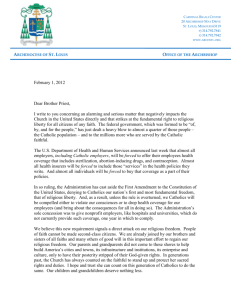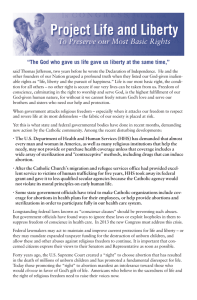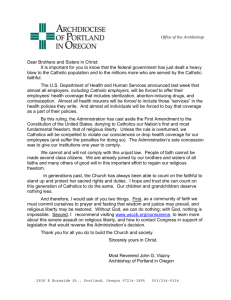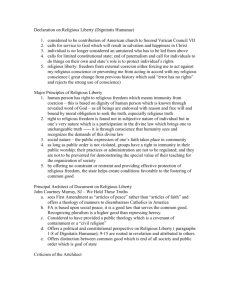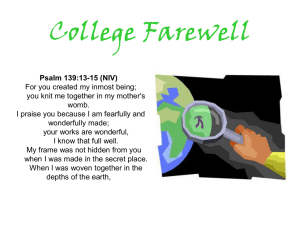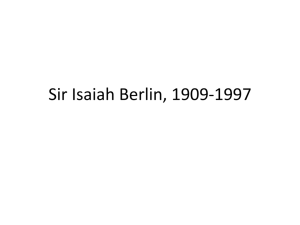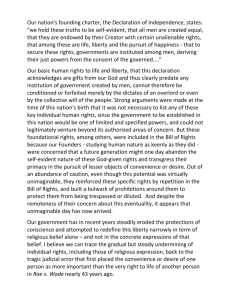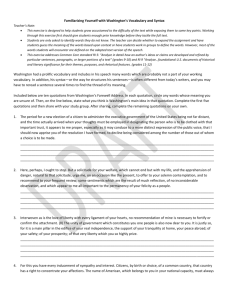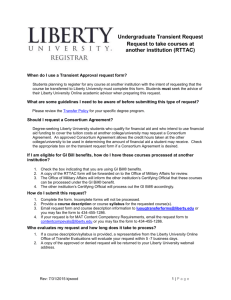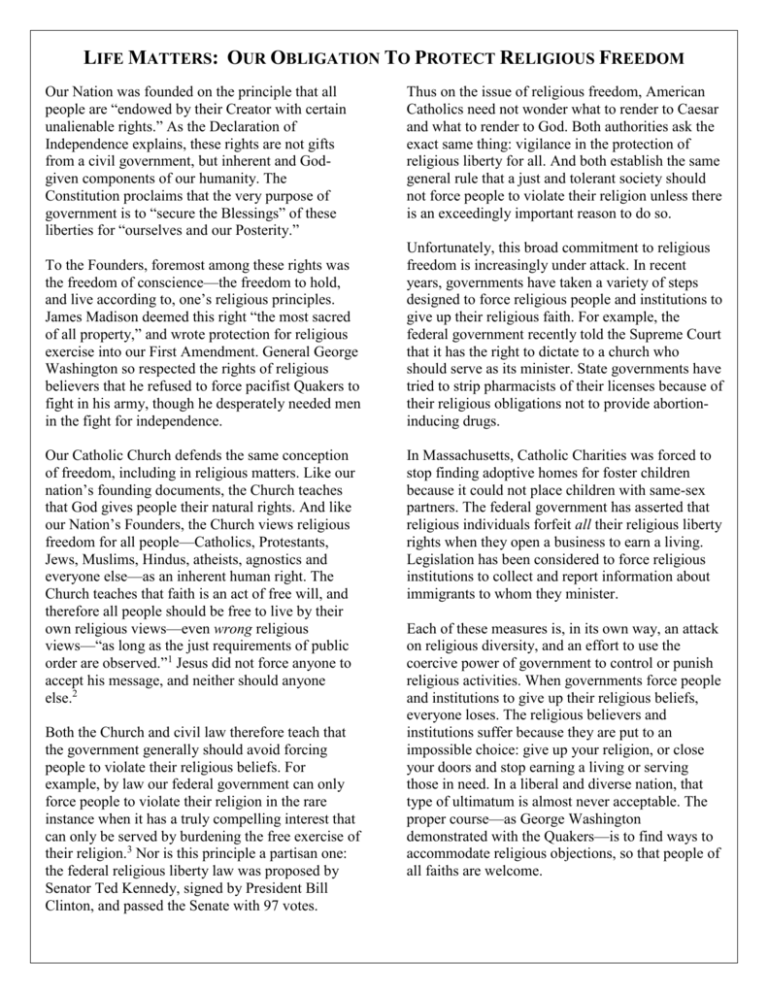
LIFE MATTERS: OUR OBLIGATION TO PROTECT RELIGIOUS FREEDOM
Our Nation was founded on the principle that all
people are “endowed by their Creator with certain
unalienable rights.” As the Declaration of
Independence explains, these rights are not gifts
from a civil government, but inherent and Godgiven components of our humanity. The
Constitution proclaims that the very purpose of
government is to “secure the Blessings” of these
liberties for “ourselves and our Posterity.”
To the Founders, foremost among these rights was
the freedom of conscience—the freedom to hold,
and live according to, one’s religious principles.
James Madison deemed this right “the most sacred
of all property,” and wrote protection for religious
exercise into our First Amendment. General George
Washington so respected the rights of religious
believers that he refused to force pacifist Quakers to
fight in his army, though he desperately needed men
in the fight for independence.
Our Catholic Church defends the same conception
of freedom, including in religious matters. Like our
nation’s founding documents, the Church teaches
that God gives people their natural rights. And like
our Nation’s Founders, the Church views religious
freedom for all people—Catholics, Protestants,
Jews, Muslims, Hindus, atheists, agnostics and
everyone else—as an inherent human right. The
Church teaches that faith is an act of free will, and
therefore all people should be free to live by their
own religious views—even wrong religious
views—“as long as the just requirements of public
order are observed.”1 Jesus did not force anyone to
accept his message, and neither should anyone
else.2
Both the Church and civil law therefore teach that
the government generally should avoid forcing
people to violate their religious beliefs. For
example, by law our federal government can only
force people to violate their religion in the rare
instance when it has a truly compelling interest that
can only be served by burdening the free exercise of
their religion.3 Nor is this principle a partisan one:
the federal religious liberty law was proposed by
Senator Ted Kennedy, signed by President Bill
Clinton, and passed the Senate with 97 votes.
Thus on the issue of religious freedom, American
Catholics need not wonder what to render to Caesar
and what to render to God. Both authorities ask the
exact same thing: vigilance in the protection of
religious liberty for all. And both establish the same
general rule that a just and tolerant society should
not force people to violate their religion unless there
is an exceedingly important reason to do so.
Unfortunately, this broad commitment to religious
freedom is increasingly under attack. In recent
years, governments have taken a variety of steps
designed to force religious people and institutions to
give up their religious faith. For example, the
federal government recently told the Supreme Court
that it has the right to dictate to a church who
should serve as its minister. State governments have
tried to strip pharmacists of their licenses because of
their religious obligations not to provide abortioninducing drugs.
In Massachusetts, Catholic Charities was forced to
stop finding adoptive homes for foster children
because it could not place children with same-sex
partners. The federal government has asserted that
religious individuals forfeit all their religious liberty
rights when they open a business to earn a living.
Legislation has been considered to force religious
institutions to collect and report information about
immigrants to whom they minister.
Each of these measures is, in its own way, an attack
on religious diversity, and an effort to use the
coercive power of government to control or punish
religious activities. When governments force people
and institutions to give up their religious beliefs,
everyone loses. The religious believers and
institutions suffer because they are put to an
impossible choice: give up your religion, or close
your doors and stop earning a living or serving
those in need. In a liberal and diverse nation, that
type of ultimatum is almost never acceptable. The
proper course—as George Washington
demonstrated with the Quakers—is to find ways to
accommodate religious objections, so that people of
all faiths are welcome.
It is not only religious believers who suffer when
religious liberty is trampled. The people served by
religious individuals and institutions also suffer
from these threats to religious liberty. Consider the
experience when Illinois tried to force all
pharmacists to sell abortion-inducing drugs.
Although the state claimed the rule was needed
because religious objectors were interfering with
access to the drugs, it eventually had to admit that
no one, ever, had been unable to get the drug
because of a religious objector. But the law still had
a very real impact on access to healthcare—it
caused at least one pharmacy to close, some
pharmacists to leave the state, and presumably
others not to join the profession—all at a time when
the state had a well-documented shortage of
pharmacists. By targeting religious objectors and
pursuing government-enforced conformity without
exceptions, the state made health care less available
for everyone.
Despite conscience protections in federal and New
Jersey state law, nurses in the
Same Day Surgery Unit of a large Newark hospital
were stunned when supervisors told them of a policy
change:
They would have to assist in abortions.
Nurse Beryl Ngoje explained: “I couldn’t do what
they were asking me to do. … You go against what
you believe, what are you? What’s left? Just a shell
of what you are.”
When more than a dozen nurses objected to the
policy in writing, they were told they could be
transferred out or even fired for refusing to comply.
Fortunately, their lawyers won an injunction halting
their mandatory abortion training and eventually
convinced the hospital to agree to a court-approved
settlement that protected the nurses’ religious
convictions against taking part in abortions and
allowed them to keep their jobs without fear of
reprisal.
The same is true in the context of the HHS
contraceptive/abortifacient mandate. Many religious
people cannot in good conscience provide insurance
coverage for abortion inducing drugs. Yet the
government is pressuring these people with the
threat of enormous fines—sometimes more than a
million dollars each day—for the sin of providing
health coverage that excludes abortion drugs. As a
society, we should not accept a government’s
decision to pressure people in this way to give up
their religion. Particularly in troubled economic
times, we should welcome and thank job creators,
and we should work around religious differences
rather than drive employers out of the public square.
Our history attests to the great benefits we all reap
when religious people and institutions are free to
bring their religious values into the public square, as
they did in the abolition movement, the Civil Rights
movement, and the labor movement.
Having all benefited from these “blessings” of
religious liberty, we have a common duty as
Catholics and Americans to consider what we can
do to ensure that we “secure” those blessings not
just “to ourselves” but also “to our Posterity.”
Possibilities abound, such as educating ourselves
and our families, contacting elected representatives,
praying, voting, and talking to our neighbors about
why religious freedom is worth protecting. In short,
we must remember that our religious diversity is a
strength, and that religious differences should be
accepted and accommodated, not stamped out by
the government.
Mark L. Rienzi is Senior Counsel at the Becket Fund for
Religious Liberty and a professor of constitutional law
at The Catholic University of America.
1
Second Vatican Council, Declaration on Religious Liberty
(Dignitatis Humanae), no. 2, in The Basic Sixteen Documents:
Vatican Council II: Constitutions, Decrees, Declarations, ed.
Austin Flannery (Northport, NY: Costello Publishing, 1966).
2
Id. at no. 11.
3
See 42 U.S.C. 2000bb.
SECRETARIAT OF PRO-LIFE ACTIVITIES
United States Conference of Catholic Bishops
3211 Fourth Street NE • Washington, DC 20017-1194
Tel: (202) 541-3070 • Fax: (202) 541-3054
Website: www.usccb.org/prolife
Photo of nurses: Alliance Defending Freedom/B.Ellefson. All rights reserved.
Copyright © 2013, United States Conference of Catholic Bishops,
Washington, D.C.

